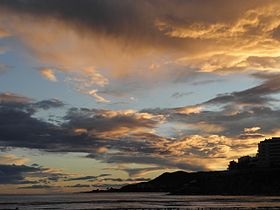|
|
| |
|
|
| |
|
|
|
|
| |
 |
| Climatology is the
scientific study of the climate. |
Climatology
Climatology (from Greek κλίμα, klima, "place, zone"; and
-λογία, -logia) or climate science is the scientific
study of climate, scientifically defined as weather
conditions averaged over a period of time. This modern
field of study is regarded as a branch of the
atmospheric sciences and a subfield of physical
geography, which is one of the Earth sciences.
Climatology now includes aspects of oceanography and
biogeochemistry.
The main methods employed by climatologists are the
analysis of observations and modelling the physical laws
that determine the climate. The main topics of research
are the study of climate variability, mechanisms of
climate changes and modern climate change. Basic
knowledge of climate can be used within shorter term
weather forecasting, for instance about climatic cycles
such as the El Niño–Southern Oscillation (ENSO), the
Madden–Julian oscillation (MJO), the North Atlantic
oscillation (NAO), the Arctic oscillation (AO), the
Pacific decadal oscillation (PDO), and the Interdecadal
Pacific Oscillation (IPO).
Climate models are used for a variety of purposes from
study of the dynamics of the weather and climate system
to projections of future climate. Weather is known as
the condition of the atmosphere over a period of time,
while climate has to do with the atmospheric condition
over an extended to indefinite period of time. |
|
Differences with meteorology
In contrast to meteorology, which focuses on short term
weather systems lasting up to a few weeks, climatology
studies the frequency and trends of those systems. It
studies the periodicity of weather events over years to
millennia, as well as changes in long-term average
weather patterns, in relation to atmospheric conditions.
Climatologists study both the nature of climates –
local, regional or global – and the natural or
human-induced factors that cause climates to change.
Climatology considers the past and can help predict
future climate change. |
|
History
Chinese scientist Shen Kuo (1031–1095) inferred that
climates naturally shifted over an enormous span of
time, after observing petrified bamboos found
underground near Yanzhou (modern day Yan'an, Shaanxi
province), a dry-climate area unsuitable for the growth
of bamboo.
Early climate researchers include Edmund Halley, who
published a map of the trade winds in 1686 after a
voyage to the southern hemisphere. Benjamin Franklin
(1706–1790) first mapped the course of the Gulf Stream
for use in sending mail from the United States to
Europe. |
|
|
|
|
|
|
|
|
|
|
|
|
|
|
|
|
|
|
Search Fun Easy English |
|
|
|
|
|
|
|
|
|
|
|
|
|
|
|
About
Contact
Copyright
Resources
Site Map |